Subsea learning tool allows pupils to dive into underwater homeschooling experience
Published: 04 May, 2020
A free underwater engineering educational resource for primary school pupils is being extended for learning at home while schools are closed during the COVID-19 pandemic.
Launched by Subsea UK in 2015, Subsea Channel was developed in collaboration with education bodies, teachers, science advisory staff and industry representatives to capture the interest and imagination of primary pupils in science subjects. Aligned to both the Scottish and UK teaching curriculums, the learning resource shows real-life applications from the subsea industry of the scientific principles taught in primary school.
Subsea Channel is aimed at 8 – 12-year old children and was developed to encourage more young people to take an interest in science. It is designed to help teachers deliver the science curriculum with videos, practical exercises and experiment instructions that engage pupils’ interest and imagination, making the subject relevant and accessible.
Neil Gordon, chief executive of Subsea UK, said: “Subsea Channel has been hugely successful within primary schools in Scotland over the last five years. The material puts science into context, showing how real-world problems can be solved and sparking children’s imagination.
“While schools are closed, we are offering the resource as an online homeschooling option. Subsea Channel is aligned to the education curriculum and is flexible enough to be incorporated into learning while children are at home. The materials combine the fascinating underwater environments, and technologies that the industry experiences everyday with the scientific principles and concepts that underpin them, translated into age appropriate language.
“Inspiring the next generation and encouraging children to take an interest in underwater science and engineering is absolutely essential to ensure the continued success of the subsea industry. We need young people to aspire to become the next generation of engineers and scientists and industry has a huge part to play in that. This learning tool demonstrates what can be achieved by business working closely with the education sector.”
Subsea Channel consists of five topics: marine biology, surveying the seabed, vessels, diving, ROVs (remotely operated vehicles) and robotics. Each topic pack contains a specific Subsea Channel film on the subject; together with a lesson plan that includes experiments and activities as well as teaching notes with supplementary information.
Accessed via a dedicated page on the Subsea UK website, the resource is freely available to schools, parents and pupils throughout the UK. Users will be asked to register which will allow Subsea UK to inform them of any updates, send on additional materials and gather feedback.
Susan Gordon, teacher at Hazlehead Primary School in Aberdeen said: "Using the Subsea Channel package in the classroom was a superb learning experience and the principles could be replicated at home under the current circumstances.
“Before studying the ROV topic, the children brought their own remote-control cars into school. They manoeuvred them around obstacles to simplistically demonstrate the theory behind what was being done under the sea which really captured their imaginations before starting the project. The in-depth technical information and video content provided is engaging and thought provoking, and the children enjoyed designing their own ROVs on paper before coding them to create short animations.”
Since Subsea Channel was launched, over 80 teachers and practitioners have undertaken CLPL (career long professional learning) Subsea Channel sessions, organised by Aberdeen Science Centre and funded by Subsea UK. These one-day practical sessions allow teachers to understand how best to use the teaching resource in the classroom environment.
For more information, visit Learning Resources page at www.subseauk.com






